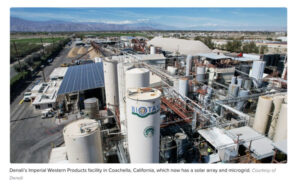That deal included multiple facilities beyond the Coachella site, but this location is considered particularly unique given its scale. It employs 125 people and can accept an estimated 400,000 tons of material per year from around the Southwest. Common feedstocks include “agricultural organic waste, bakery waste, salvaged and distressed pet food, recalled and off spec human grade food, and used cooking oil.”
California has a goal to reduce organic waste disposal 75% by 2025 under SB 1383. David Isen, Denali’s vice president of advocacy and policy, said this makes the facility pertinent for commercial and industrial clients such as retailers, breweries, food manufacturers and others.
“Demand is up. There’s not enough infrastructure so obviously a diverse problem needs a diverse solution and we’ve been able to fill that need,” he said. “We are one of the rare businesses that can handle a diverse array of food waste.”
Isen noted that the facility was affected by energy issues in California last year, but will now be more resilient in the future. The Imperial microgrid project is considered one of the largest of its kind in the state, especially in the agricultural sector.
“They have always thought outside the box, been problem solvers, and they are the only commercial feed licensee to be a recipient of this grant and to be working toward clean energy,” said Jenna Leal, environmental program manager at the California Department of Food and Agriculture, in a statement.
While anaerobic digesters and compost sites are expected to handle a sizable share of California’s overall organic waste — and Denali also has a large presence in composting — Isen said those processes are often better suited to more homogeneous streams. He also noted that the U.S. EPA’s food recovery hierarchy places food recovery for animals, as well as industrial uses, above composting.
Denali’s animal feed process is proprietary but Isen said that depending on the feedstock it can include depackaging as an initial step. Biodiesel is created through a rendering process. Last year, the Coachella site created more than 33,000 tons of animal feed from material such as bakery and cotton seed — with much of that going to California dairy farms — along with 10 million gallons of biodiesel.
Looking ahead, Isen said more processing infrastructure will be key to ensuring California can hit the SB 1383 target. As for whether the state’s fleet electrification goals could reduce demand for biodiesel in the future, Isen said that will be many years in the making and described this as a useful diesel replacement during any potential transition.
“We don’t have to wait decades to make an environmental impact,” said Isen. “We can do it and are doing it in California as we speak.”
Last year, Republic Services also launched what it described as California’s first fully solar-powered composting operation as part of an ongoing trend around solar projects at waste sites.

